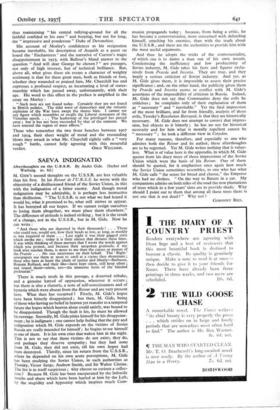SAEVA INDIGNATIO
M. GIDE'S second thoughts on the U.S.S.R. are less valuable than his first. In his Retour de l'U.R.S.S. he wrote with the objectivity of a disillusioned friend of the Soviet Union, in this
with the indignation of a bitter enemy. And though moral indignation may be admirable, it is perhaps less instructive than disillusion. "The U.S.S.R. is not what we had hoped it woulci be, what it promised to be, what still strives to appear. It has betrayed all our hopes. If we cannot resign ourselves to losing them altogether, we must place them elsewhere."
The difference of attitude is indeed striking ; but it is the result of a change, not in the U.S.S.R., but in M. Gide. Now he can write :
"And those who are deported in their thousands ! . . . Those who could not, would not, bow their heads as low, as long, as meekly as was required of them . . . Last night it was their gagged cries which awoke me today it is their silence that dictates these lines. It was while thinking of these martyrs that I wrote the words against which you proteit, and because their unspoken gratitude, if my book ever reaches them, is more to me than the curses or praises of the Pravda. . . No one intervenes on their behalf. The ` Right ' newspapers use them at most to cavil at a regime they abominate ; those who have at heart the ideals of justice and liberty—Barbusse, Romain Rolland, and their like—have kept silent, still keep silent ; and round them—silent, too—the immense hosts of the blinded proletariat?'
There' is much truth in this passage, a deserved rebuke, and a genuine hatred of oppression, wherever it occurs ; but there is also a rhetoric, a note of self-consciousness and of hysteria which were absent from the Retour and are very present here. What then has occurred ? Firstly, M. Gide's hopes have been bitterly disappointed ; but then, M. Gide, being of those who having no belief in heaven yet transfer to a temporal future the hopes which heaven alone could satisfy, was bound to be disappointed. Though the fault is his, he must be allowed his revenge. Secondly, M. Gide pities himself for his disappoint- ment ; he is indignant ; one cannot help feeling that the pity and indignation which M. Gide expends on the victims of Soviet
Russia are really intended for himself; he begins t&see himself as one of them. It is his own cries that waken him in the night.
This is not to say that those victims do not exist; they do, and perhaps they deserve sympathy; but they had none from M. Gide, they did not exist, till his own hopes had been destroyed. Thirdly, since his return from the U.S.S.R., where he depended on his own acute perceptions, M. Gide has been studying the Soviet Union, in such authorities as Trotsky, Victor Serge, Andrew Smith, and Sir Walter Citrine.
The list is in itself suspicious ; Why choose so curious a collec- tion? Because M. Gide has been exasperated by the Imbecile insults and abuse which have been hurled at him by the Left, by the stupidity and hypocrisy which inspires much Corn-
munist propaganda today ; because, from 'being a critic, he has become a controversialist, more concerned with defending himself, attacking his enemies, than with the truth about the U.S.S.R., and these are the authorities to provide him with the most useful arguments.
And thus he adopts the tricks of the controversialist, of which one is to damn a man out of his own mouth. Condemning the inefficiency and low productivity of Soviet industry, M. Gide takes his facts and figures exclu- sively from Pravda and Isvestia. They are true, and they imply a serious criticism of Soviet industry. And yet, as M. Gide gives them, it is impossible to assess their precise significance ; and, on the other hand, the publicity given them by Pravda and Isvestia seems to conflict with M. Gide's assertions of the impossibility of criticism in Russia. Indeed, M. Gide does not say that Communists deny the evils he criticises ; he complains only of their explanation of them as " necessary " and "inevitable." Yet the final impression of the most brilliant, and far from friendly, analysis of these evils, Trotsky's Revolution Betrayed, is that they are historically necessary. M. Gide does not attempt to correct that impres- sion, but objects to it bitterly ; he has no use for historical necessity and for him what is morally repellent cannot be " necessary " ; he took a different view in Corydon.
For many reasons, therefore, and especially to one who admires both the Retour and its author, these afterthoughts are to be regretted. Yet M. Gide writes nothing that is value- less. What is of value here is the appendix, in which M. Gide quotes from his diary more of those impressions of the Soviet Union which were the basis of his Retour. One of them should be quoted, for it emphasises once again how much the Soviet Union sometimes resembles, to one who has what M. Gide calls "the sense for bread and cheese," the Emperor who had no clothes. "On the way to Batum in a car. My companions admire on both sides of the road the new plantations of trees which in a few years' time are to provide shade. Why should I point out to them that among all these trees there is not one that is not dead ? " Why not ?
GORONWY REES.






















































 Previous page
Previous page